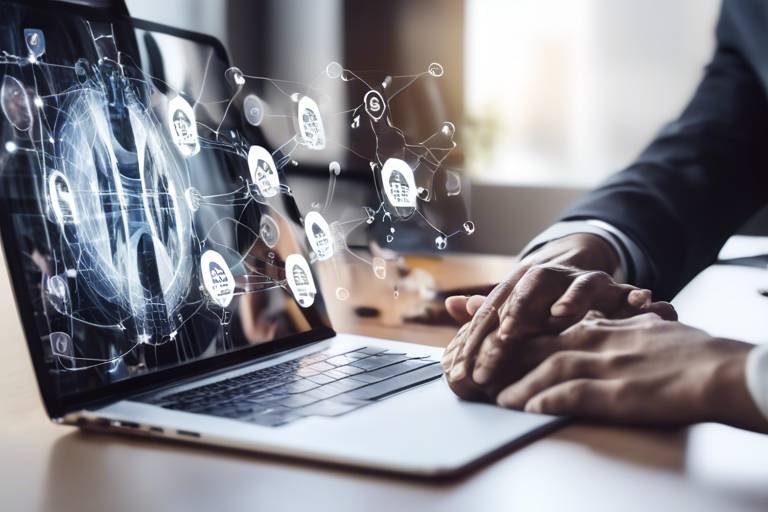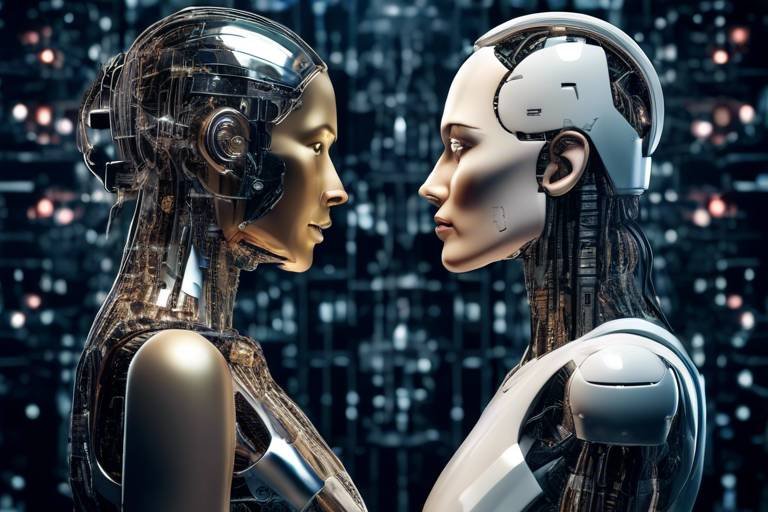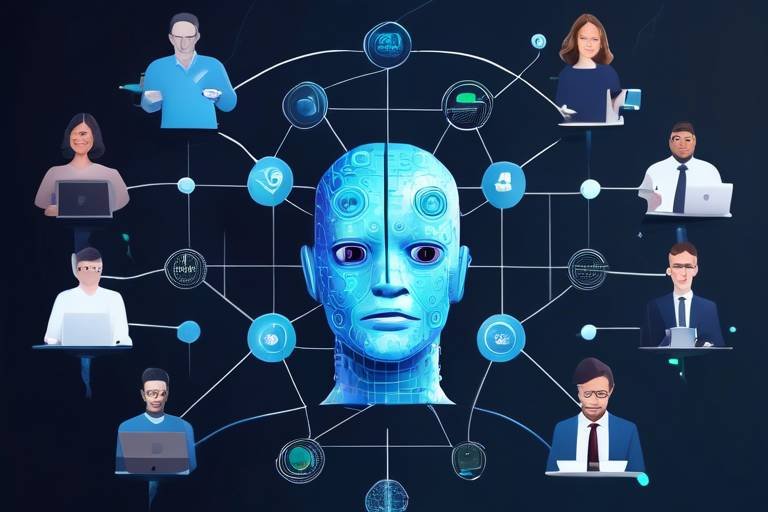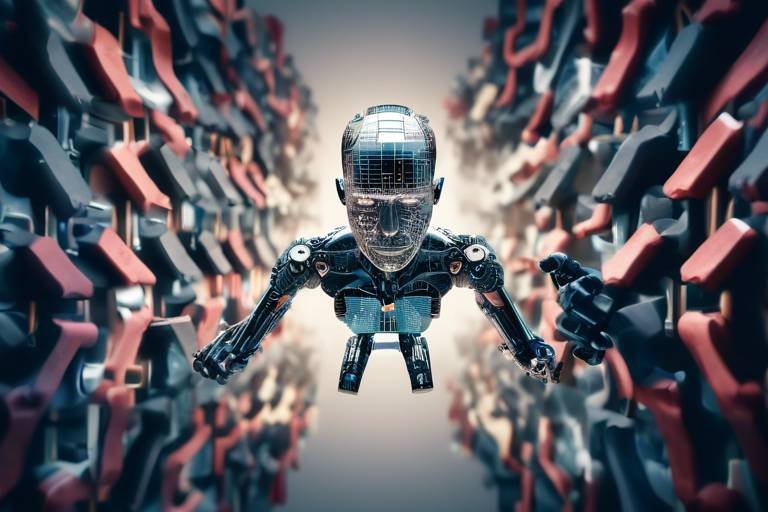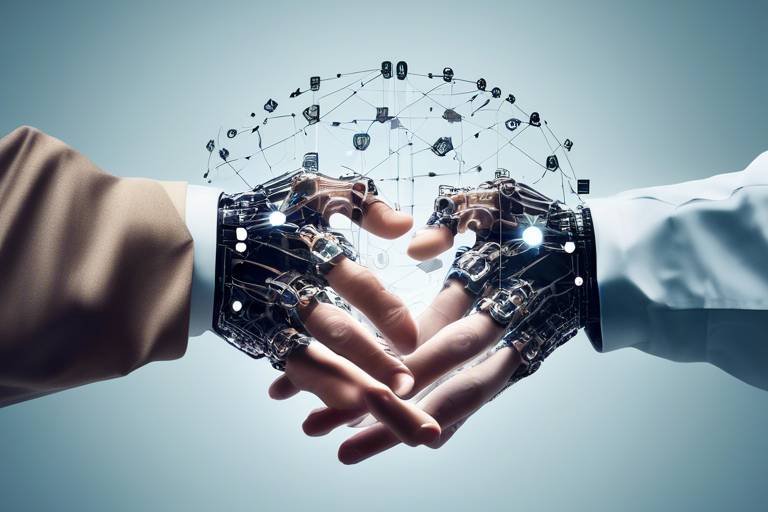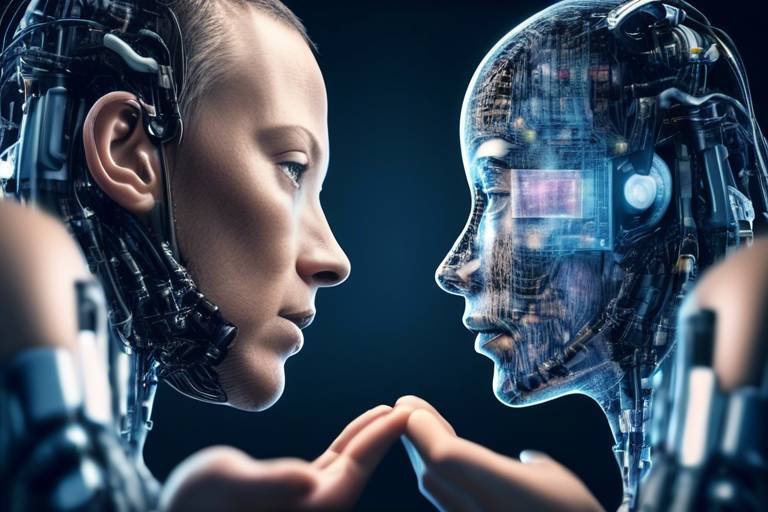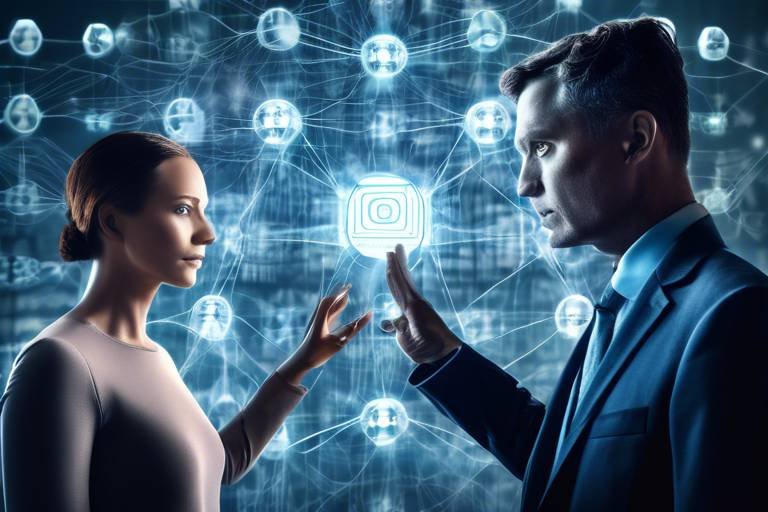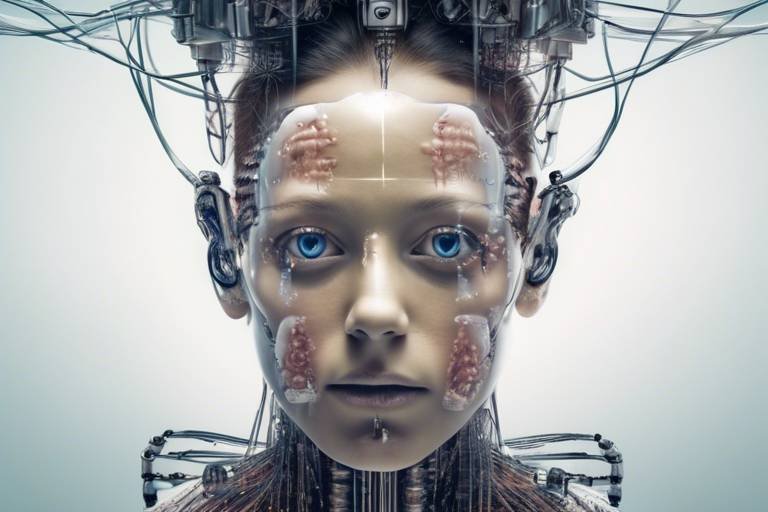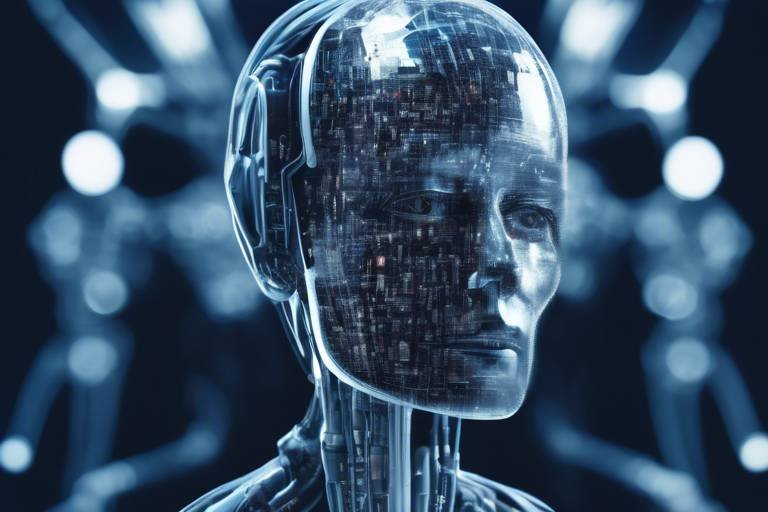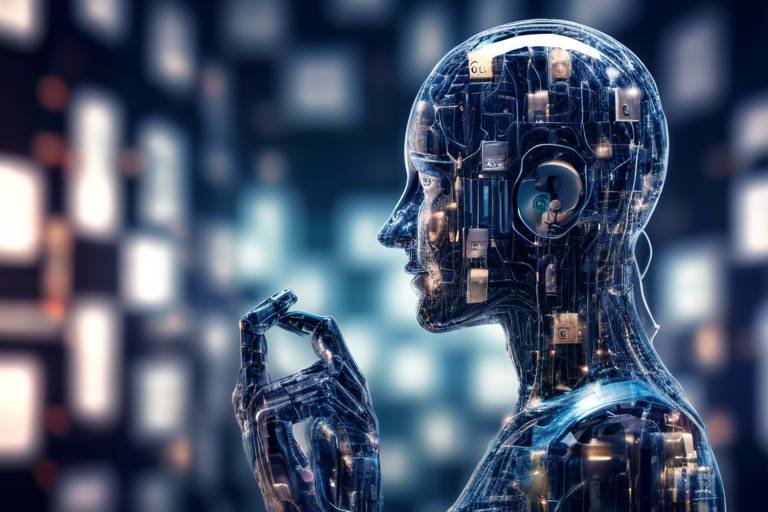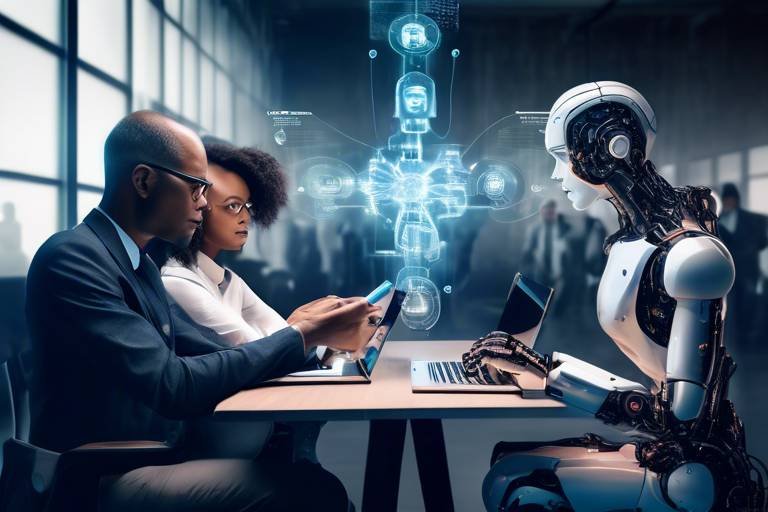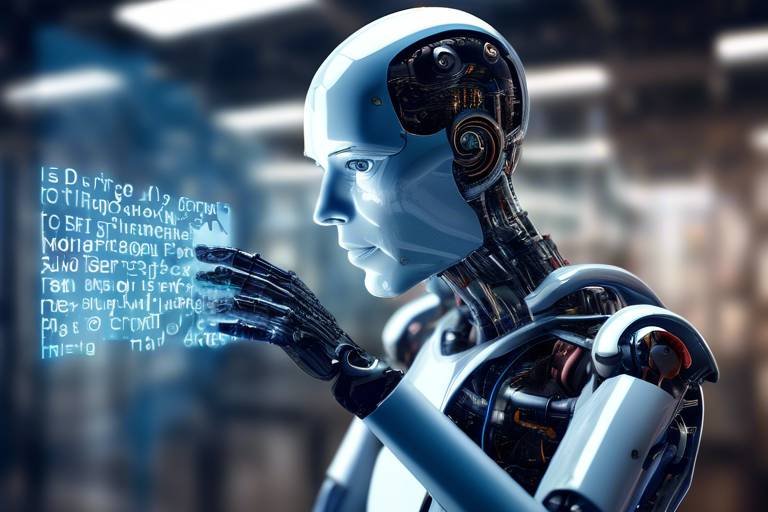How AI is Essential in Elevating Human Collaboration
In today's fast-paced world, the need for effective collaboration among teams has never been more crucial. As organizations strive for innovation and efficiency, artificial intelligence (AI) emerges as a game-changer, revolutionizing the way we work together. Imagine a world where the mundane tasks that consume our time are automated, allowing us to focus on what truly matters—creativity, strategy, and building relationships. AI is not just a tool; it’s a partner in collaboration, enhancing communication, boosting productivity, and fostering a harmonious working environment.
Consider how we communicate daily. Misunderstandings can lead to conflicts, missed deadlines, and frustration. With AI-driven communication tools, these challenges can be minimized. AI analyzes interactions, providing insights that help teams communicate more effectively. Picture a virtual assistant that understands your team's preferences and can suggest the best times for meetings, ensuring everyone is on the same page. This level of clarity transforms the chaotic back-and-forth of scheduling into a seamless experience, allowing teams to concentrate on their goals rather than logistics.
Moreover, the integration of AI in project management redefines how teams operate. Imagine having a project management software that not only tracks tasks but also predicts potential bottlenecks before they occur. By analyzing data in real-time, AI can allocate resources intelligently, ensuring that projects stay on track and within budget. This proactive approach enables teams to pivot quickly in response to challenges, fostering a culture of agility and responsiveness. In a sense, AI acts like a skilled conductor, harmonizing the various elements of a project to create a symphony of productivity.
But the magic of AI doesn’t stop there. It extends into the realm of conflict resolution, where it can detect early signs of discord among team members. By analyzing communication patterns and feedback, AI can suggest interventions that promote a healthier team dynamic. Think of it as having a mediator who can provide insights before issues escalate, allowing teams to maintain focus and morale. This proactive management of interpersonal relationships is essential for sustaining collaboration in any organization.
Furthermore, the personalization of collaborative tools through AI cannot be overlooked. Just as no two individuals are alike, no two teams function the same way. AI’s ability to analyze user behavior means that collaborative tools can be tailored to meet the unique needs of each team member. This customization enhances user engagement, making collaboration not just effective but also enjoyable. Picture a workspace that adapts to your preferences, learning and evolving as you do—this is the future AI promises.
As we delve deeper into the world of AI and collaboration, it's clear that the synergy between human creativity and artificial intelligence is a powerful combination. Together, they can create environments where innovation thrives, communication flows freely, and productivity soars. The potential for AI to elevate human collaboration is limitless, paving the way for a new era of teamwork that embraces technology while valuing the human touch. So, are you ready to embrace this transformation and unlock the full potential of your team?
- How does AI improve communication in teams?
AI tools streamline communication by analyzing interactions and providing insights that reduce misunderstandings, ensuring clearer exchanges among team members. - Can AI really boost team productivity?
Yes! By automating repetitive tasks, AI allows teams to focus on strategic initiatives, enhancing overall productivity and efficiency. - What are some examples of AI-powered project management tools?
Tools like Asana, Trello, and Monday.com utilize AI to help teams plan, execute, and monitor tasks effectively, improving project outcomes. - How does AI assist in conflict resolution?
AI can identify potential conflicts by analyzing communication patterns and suggest resolutions, promoting a harmonious working environment. - Why is personalization important in collaborative tools?
Personalization enhances user engagement and satisfaction by tailoring tools to meet individual needs, making collaboration more effective and enjoyable.

The Role of AI in Communication
In the fast-paced world we live in, effective communication is the backbone of any successful team. Enter artificial intelligence—the game-changer we didn't know we needed. AI technologies are revolutionizing the way teams communicate, making interactions not only clearer but also more efficient. Imagine a scenario where misunderstandings are minimized, and everyone is on the same page. Sounds like a dream, right? Well, with AI, it's becoming a reality.
AI-driven tools are designed to streamline communication processes. For instance, platforms like Slack and Microsoft Teams now incorporate AI features that help in real-time collaboration. These tools analyze conversations, prioritize messages, and even suggest responses, reducing the time spent sifting through endless threads. It's like having a personal assistant that filters out the noise, allowing you to focus on what truly matters.
Moreover, AI can help in breaking down language barriers. With advanced translation capabilities, team members from different linguistic backgrounds can communicate seamlessly. This is especially crucial in today's globalized work environment where teams are often scattered across different continents. Imagine being able to send a message and having it translated instantly, ensuring that everyone understands the context without delay. It's like having a universal translator at your fingertips!
Another significant benefit of AI in communication is its ability to analyze data and provide insights. By tracking communication patterns, AI can identify areas where misunderstandings frequently occur. For example, if a team notices that certain phrases lead to confusion, they can adjust their communication style accordingly. This data-driven approach not only enhances clarity but also fosters a culture of continuous improvement within the team.
To put it simply, AI acts as a catalyst for better communication. Here are a few key ways it enhances teamwork:
- Real-Time Collaboration: AI tools facilitate instant messaging and video conferencing, making it easier for teams to connect regardless of their physical location.
- Smart Notifications: AI can prioritize messages based on urgency, ensuring that critical information doesn't get lost in the shuffle.
- Sentiment Analysis: Some AI systems can analyze the tone of messages, helping teams gauge the emotional context behind communications and respond appropriately.
In conclusion, the role of AI in enhancing communication cannot be overstated. By leveraging these advanced technologies, teams can not only improve their communication processes but also foster a more collaborative and harmonious working environment. The future of teamwork is here, and it's powered by AI!

Enhancing Team Productivity with AI
In today's fast-paced work environment, where every second counts, artificial intelligence (AI) emerges as a powerful ally in enhancing team productivity. Imagine a scenario where your team can focus on creative problem-solving rather than getting bogged down by mundane tasks. That’s the magic of AI! By automating repetitive activities, AI liberates team members to engage in more strategic initiatives, ultimately driving better results and fostering a culture of innovation.
One of the most significant advantages of AI in the workplace is its ability to streamline workflows. For instance, consider how AI-driven tools can manage data entry, scheduling, and even customer inquiries. This not only saves time but also reduces the chance of human error, which can often lead to miscommunication or delays. When teams can trust that their tools are handling the routine efficiently, they can redirect their energy toward tasks that require human creativity and critical thinking.
Moreover, AI-powered project management tools are revolutionizing how teams collaborate. These tools utilize algorithms to analyze project data, enabling intelligent resource allocation and task prioritization. For example, if a project is falling behind schedule, AI can recommend reallocating resources or adjusting deadlines based on team performance and workload. This proactive approach helps teams stay on track and meet their goals more effectively.
Let’s dive deeper into some specific AI-powered project management tools that are making waves in the industry. Tools like Asana, Trello, and Monday.com are integrating AI features to enhance user experience and efficiency. These platforms not only help in task management but also provide insights into team performance, allowing for better decision-making. For instance:
| Tool | AI Feature | Benefit |
|---|---|---|
| Asana | Smart project templates | Reduces setup time for new projects |
| Trello | Butler automation | Automates repetitive tasks like assigning members |
| Monday.com | AI-driven insights | Provides data-driven recommendations for project adjustments |
These tools exemplify how AI can transform project management into a more intuitive and efficient process. By leveraging AI, teams can ensure that everyone is on the same page, and that tasks are completed on time and within budget. But that's not all—AI also plays a crucial role in enhancing team dynamics.
Another area where AI shines is in scheduling and coordination. Traditional scheduling can often feel like a game of Tetris, with team members juggling various commitments and trying to find a common time to meet. AI simplifies this process by analyzing availability and preferences, allowing teams to coordinate meetings with ease. Imagine an AI tool that can automatically suggest the best times for meetings based on everyone's calendars, preferences, and even time zones! This not only saves time but also reduces the frustration of back-and-forth emails trying to pin down a meeting.
Furthermore, AI enables real-time progress tracking, which is essential for maintaining momentum in collaborative projects. With AI tools, teams can monitor their progress continuously, making it easier to identify bottlenecks and address them promptly. For instance, if a team member is falling behind on a task, AI can alert the team, allowing for quick intervention before the delay impacts the overall project timeline. This level of transparency fosters accountability and encourages a proactive approach to problem-solving.
In conclusion, the integration of AI in enhancing team productivity is not just a trend; it's a necessity for organizations looking to thrive in a competitive landscape. By automating mundane tasks, optimizing project management, and facilitating seamless communication, AI empowers teams to focus on what truly matters—innovation and collaboration. So, why not embrace these intelligent tools and unlock the full potential of your team?
- How does AI improve team communication?
AI tools streamline communication processes, ensuring clearer and more efficient exchanges among team members. - Can AI help in conflict resolution?
Yes, AI can identify potential conflicts and suggest resolutions, contributing to a harmonious work environment. - What are some examples of AI-powered project management tools?
Tools like Asana, Trello, and Monday.com utilize AI features to enhance productivity and project tracking. - How does AI personalize collaborative tools?
AI analyzes user behavior to customize tools, improving user engagement and satisfaction.

AI-Powered Project Management Tools
In today’s fast-paced work environment, are revolutionizing the way teams collaborate and execute their projects. Imagine having a digital assistant that not only organizes your tasks but also anticipates your needs and optimizes your workflow. These tools leverage artificial intelligence to provide insights that were previously unimaginable, making project management more intuitive and less stressful.
One of the standout features of these tools is their ability to analyze data and provide actionable insights. For instance, AI can assess past project performances, identify bottlenecks, and suggest improvements based on historical data. This means that teams can make informed decisions that enhance productivity and reduce the likelihood of project delays. With real-time data at their fingertips, project managers can pivot strategies swiftly, ensuring that projects stay on track.
Moreover, AI-powered tools often include features like automated resource allocation. This means that the system can intelligently assign tasks to team members based on their availability, skills, and workload. Imagine a scenario where a project manager spends hours figuring out who should handle what task. With AI, this process is streamlined, allowing for a more efficient distribution of responsibilities. The result? Teams can focus on what they do best instead of getting bogged down in administrative tasks.
Let’s take a look at some popular AI-powered project management tools:
| Tool Name | Key Features | Best For |
|---|---|---|
| Asana | Task automation, project tracking, team collaboration | Small to medium-sized teams |
| Trello | Visual task management, automation with Butler, integrations | Creative teams and freelancers |
| Monday.com | Custom workflows, time tracking, reporting | Large teams and enterprises |
These tools not only enhance efficiency but also foster a culture of collaboration. Teams can communicate seamlessly within the platform, share updates, and provide feedback in real-time. This reduces the chances of miscommunication, which is often a significant hurdle in collaborative projects. Additionally, the integration of AI means that these platforms are constantly learning from user interactions, which leads to ongoing improvements in functionality and user experience.
In conclusion, AI-powered project management tools are not just a trend; they are a game-changer for teams looking to enhance their collaborative efforts. By automating mundane tasks, providing insightful data, and fostering better communication, these tools empower teams to achieve their goals more effectively and efficiently. As we continue to embrace technology in our work processes, it’s clear that AI will play a crucial role in shaping the future of teamwork.
- What are AI-powered project management tools?
These are software solutions that utilize artificial intelligence to enhance project planning, execution, and monitoring, facilitating better collaboration among team members. - How do these tools improve team productivity?
By automating repetitive tasks and providing real-time insights, AI tools allow teams to focus on strategic initiatives rather than administrative work. - Can AI help with conflict resolution in teams?
Yes, AI can identify potential conflicts based on communication patterns and suggest resolutions, contributing to a more harmonious working environment.

Automated Scheduling and Coordination
In today's fast-paced work environment, time is often a precious commodity. When teams are scattered across different locations, coordinating schedules can feel like trying to solve a Rubik's Cube blindfolded. This is where automated scheduling comes into play, revolutionizing the way teams organize their meetings and collaborative efforts. By leveraging AI technologies, automated scheduling tools can analyze the availability of team members, taking into account their preferences and commitments, and suggest the best times for meetings with astonishing accuracy.
Imagine a scenario where you have a team of five people, each with different schedules, commitments, and time zones. In the past, finding a common time for everyone to meet could lead to a back-and-forth email chain that feels endless. However, with AI-driven scheduling tools, this process becomes incredibly streamlined. These tools can gather data on when each team member is free, suggest optimal meeting times, and even send out calendar invites automatically. This not only saves time but also reduces the stress associated with scheduling conflicts.
Furthermore, automated scheduling tools can integrate seamlessly with existing calendars, ensuring that any changes or updates are reflected in real-time. For instance, if a team member has a last-minute conflict, the system can quickly propose alternative times based on everyone's availability. This level of agility is crucial in maintaining productivity and ensuring that important discussions happen without unnecessary delays.
To illustrate the impact of automated scheduling, consider the following table that compares traditional scheduling methods with AI-powered solutions:
| Aspect | Traditional Scheduling | Automated Scheduling |
|---|---|---|
| Time to Schedule | Hours of back-and-forth communication | Minutes with instant suggestions |
| Conflict Resolution | Manual adjustments and rescheduling | Automatic conflict detection and resolution |
| Integration | Requires manual updates | Real-time calendar syncing |
| User Experience | Frustrating and time-consuming | Smooth and efficient |
In addition to improving efficiency, automated scheduling also fosters a culture of respect for everyone's time. When meetings are scheduled effectively, team members can focus on their work without the anxiety of overlapping commitments. This leads to a more engaged and productive team, as individuals feel valued and their time is respected. Moreover, the use of AI in scheduling can even enhance inclusivity by considering different time zones and personal preferences, ensuring that all voices are heard, regardless of geographical barriers.
In conclusion, automated scheduling and coordination not only simplify the logistics of setting up meetings but also contribute to a more harmonious and productive work environment. As teams continue to embrace remote and hybrid work models, the importance of effective scheduling will only grow. By harnessing the power of AI, organizations can ensure that their teams remain connected, engaged, and ready to collaborate, no matter where they are in the world.

Real-Time Progress Tracking
In today's fast-paced work environment, has become a game-changer for teams striving to maintain momentum and achieve their goals. Imagine trying to navigate a ship without a compass; that's how teams function without the ability to monitor their progress continuously. With AI-powered tools, teams can now gain instant visibility into their projects, allowing them to make informed decisions on the fly. This capability is akin to having a GPS system that not only tells you where you are but also predicts the best route to your destination.
One of the key benefits of real-time progress tracking is the ability to identify potential bottlenecks before they escalate into major issues. For instance, AI can analyze the data collected from various project stages and flag tasks that are falling behind schedule. This proactive approach enables teams to reallocate resources or adjust timelines as needed, ensuring that projects stay on track. To illustrate, consider the following table that highlights the impact of real-time tracking on project delivery:
| Project Phase | Traditional Tracking | Real-Time Tracking | Impact |
|---|---|---|---|
| Planning | Static updates | Dynamic adjustments | Increased accuracy in timelines |
| Execution | Monthly reviews | Daily insights | Enhanced responsiveness |
| Closure | Post-mortem analysis | Continuous feedback | Improved future planning |
Furthermore, real-time tracking fosters a culture of accountability within teams. When everyone can see the status of tasks and who is responsible for what, it creates a sense of ownership among team members. No one wants to be the one holding up the project, and this awareness often motivates individuals to stay engaged and proactive. In essence, it turns the team into a well-oiled machine, where each cog is aware of its role and the importance of its contribution.
Moreover, the integration of AI in progress tracking tools allows for more than just monitoring; it can also provide insights into team dynamics and performance trends. For example, by analyzing patterns in task completion and collaboration efforts, AI can suggest optimal team structures or workflows that enhance productivity. This means that teams are not just tracking their progress but also evolving their strategies based on real-time data.
In conclusion, real-time progress tracking is not merely a feature; it's a vital component of successful collaboration in the modern workplace. By leveraging AI technologies, teams can ensure that they remain agile, responsive, and aligned with their objectives. So, next time you embark on a project, remember the power of real-time insights—it could very well be the difference between success and failure.
- What is real-time progress tracking? Real-time progress tracking refers to the continuous monitoring of project tasks and milestones, allowing teams to adjust their strategies and resources as needed.
- How does AI enhance progress tracking? AI enhances progress tracking by providing data-driven insights, identifying bottlenecks, and suggesting optimal workflows based on real-time data analysis.
- Why is accountability important in teamwork? Accountability fosters a sense of ownership among team members, motivating them to contribute effectively and ensuring that projects stay on track.

AI in Conflict Resolution
In the fast-paced world of teamwork, conflicts are as inevitable as Monday mornings. But what if I told you that artificial intelligence could play a pivotal role in not just identifying these conflicts but also in resolving them? Imagine having a smart assistant that can detect the subtle signs of discord among team members before they escalate into full-blown disputes. That’s the power of AI in conflict resolution.
AI technologies can analyze communication patterns and sentiment, acting like a digital mediator. By examining emails, chat messages, and even voice conversations, AI can pinpoint moments of tension or misunderstanding. This proactive approach allows teams to address issues before they spiral out of control, fostering a more harmonious work environment.
For instance, consider a scenario where two colleagues disagree on a project direction. An AI tool can analyze their past interactions and identify common ground or suggest compromises based on their communication styles. This not only helps in resolving the immediate conflict but also strengthens the overall team dynamics.
Moreover, AI can provide recommendations for effective communication strategies tailored to individual team members. This personalization ensures that each person feels heard and valued, which is crucial in any collaborative effort. Here are a few ways AI contributes to conflict resolution:
- Sentiment Analysis: AI tools can gauge the emotional tone of conversations, alerting managers to potential issues before they escalate.
- Recommendation Systems: Based on the analysis, AI can suggest the best approaches for conflict resolution tailored to the individuals involved.
- Data-Driven Insights: By analyzing past conflicts and their resolutions, AI can identify patterns and recommend strategies that have worked in similar situations.
One of the most exciting aspects of AI in conflict resolution is its ability to learn and adapt over time. As it processes more data, it becomes increasingly adept at recognizing the nuances of team dynamics. This continuous learning means that AI can offer increasingly effective solutions, making it a valuable asset in any collaborative environment.
In conclusion, the integration of AI in conflict resolution is not just about technology; it's about enhancing human relationships and fostering a culture of open communication. By leveraging AI, teams can not only resolve conflicts more effectively but also build stronger, more resilient working relationships. So, next time you're faced with a disagreement at work, consider how AI might help turn that conflict into an opportunity for growth and collaboration.
- How does AI detect conflicts in teams? AI analyzes communication patterns and sentiment to identify potential conflicts before they escalate.
- Can AI suggest ways to resolve conflicts? Yes, AI can recommend tailored communication strategies and solutions based on past interactions.
- Is AI capable of learning from past conflicts? Absolutely! AI systems improve over time by learning from previous data, making them more effective in conflict resolution.
- What are the benefits of using AI for conflict resolution? AI helps in early detection, personalized recommendations, and continuous learning, leading to a more harmonious work environment.

Personalization of Collaborative Tools
In today's fast-paced digital landscape, the need for effective collaboration among team members is more critical than ever. Enter artificial intelligence (AI), a game-changer in personalizing collaborative tools. Imagine a workspace that adapts to your unique preferences, learning styles, and work habits. Sounds incredible, right? Well, that's the magic AI brings to the table. By analyzing user behavior and interactions, AI can tailor collaborative platforms to meet the specific needs of each individual, making teamwork not just easier but also more engaging.
One of the remarkable aspects of AI is its ability to create a personalized experience that enhances user engagement. For instance, consider a project management tool that learns which features you use most frequently. It can prioritize those functions in your dashboard, allowing you to navigate the platform with ease. This kind of adaptability means less time spent fumbling through menus and more time focused on what truly matters: collaboration and productivity. As teams become increasingly diverse, personalization ensures that every member can contribute effectively, regardless of their working style.
Moreover, the personalization of collaborative tools extends beyond mere interface adjustments. AI can analyze team dynamics and suggest customized workflows that align with each member's strengths and weaknesses. For example, if a team member excels in creative brainstorming but struggles with data analysis, AI can recommend tools and resources that support their contributions while also facilitating collaboration with those who possess complementary skills. This holistic approach not only boosts individual performance but also enhances overall team synergy.
Another fascinating aspect of AI-driven personalization is its role in fostering a sense of ownership among team members. When tools are tailored to fit individual needs, users are more likely to engage with them actively. This engagement can lead to higher satisfaction levels and improved outcomes. In fact, a study found that teams using personalized collaborative tools reported a 30% increase in productivity compared to those using standard, one-size-fits-all solutions.
To illustrate the impact of personalized collaborative tools, consider the following table that highlights key benefits:
| Benefit | Description |
|---|---|
| Enhanced Engagement | Users are more likely to interact with tools designed for their preferences. |
| Improved Productivity | Tailored workflows lead to more efficient task completion. |
| Better Team Dynamics | Custom tools foster collaboration by aligning individual strengths. |
| Increased Satisfaction | Personalized experiences lead to higher user satisfaction and retention. |
In conclusion, the personalization of collaborative tools powered by AI is not just a trend; it's a necessity in the modern workplace. By leveraging AI's capabilities, organizations can create environments where every team member feels valued and empowered to contribute their best work. As we continue to embrace technology, the future of collaboration looks not only smarter but also more human-centric.
- How does AI personalize collaborative tools?
AI analyzes user behavior and preferences to customize features and workflows, enhancing the overall user experience. - What are some examples of AI-powered collaborative tools?
Examples include project management software like Asana and Trello, which use AI to optimize task assignments and team communication. - Can personalized tools improve team productivity?
Yes, personalized tools can lead to a significant increase in productivity by streamlining workflows and reducing time spent on non-essential tasks. - Is it difficult to implement AI in existing collaborative tools?
Many modern collaborative tools come with built-in AI features, making implementation relatively straightforward.

Adaptive Learning Systems
In the fast-paced world of teamwork, powered by artificial intelligence are revolutionizing the way we approach skill development. Imagine a training program that molds itself around your unique learning style, preferences, and pace—sounds like something out of a sci-fi movie, right? But this is the reality we are stepping into. These systems analyze user behavior, identifying strengths and weaknesses, and then adjust the content accordingly. This means that instead of a one-size-fits-all approach, each team member receives a tailored experience that maximizes their potential.
Consider the traditional training methods that often lead to frustration and disengagement. With adaptive learning, employees are not just passive recipients of information; they are active participants in their own growth. This method ensures that everyone is on the same page while also catering to individual needs. For example, if a team member excels in certain areas but struggles in others, the system can provide additional resources or challenges specifically designed to bridge those gaps. This personalized approach fosters a culture of continuous improvement and collaboration, which is essential in today’s dynamic work environments.
Moreover, adaptive learning systems can be integrated into various collaborative tools, making them easily accessible. Whether it's through a project management platform or a dedicated training app, team members can engage with the learning material at their convenience. The flexibility of these systems not only enhances user engagement but also promotes a sense of ownership over personal development. Imagine being able to learn at your own pace while still contributing effectively to team projects—this is the magic of adaptive learning!
To illustrate the impact of adaptive learning systems, let’s take a look at a simple comparison of traditional training versus adaptive learning:
| Aspect | Traditional Training | Adaptive Learning Systems |
|---|---|---|
| Customization | Fixed curriculum for all | Tailored content based on individual needs |
| Engagement | Passive learning | Active participation and interaction |
| Feedback | Delayed feedback | Real-time insights and adjustments |
| Learning Pace | Set pace for all | Self-paced learning opportunities |
As organizations increasingly adopt these advanced systems, the benefits become clear. Not only do adaptive learning systems enhance individual skill sets, but they also improve overall team performance. By equipping team members with the right tools and knowledge, organizations can foster a more collaborative environment where everyone feels empowered to contribute their best work. Ultimately, this leads to increased productivity and a more harmonious workplace culture.
In conclusion, the integration of adaptive learning systems into collaborative frameworks is not just a trend; it’s a necessity for organizations aiming to thrive in a competitive landscape. By embracing these technologies, teams can unlock their full potential, driving innovation and success together.
- What are adaptive learning systems? Adaptive learning systems are AI-powered tools that customize educational content based on individual learning styles and performance.
- How do adaptive learning systems improve team collaboration? They provide personalized training experiences, ensuring that all team members develop the necessary skills to work effectively together.
- Can adaptive learning systems be integrated with existing tools? Yes, these systems can be seamlessly integrated into various collaborative platforms to enhance user experience and engagement.
- What are the benefits of personalized training? Personalized training leads to higher engagement, better retention of information, and a more skilled workforce, ultimately benefiting the organization as a whole.

Feedback and Performance Analysis
In today's fast-paced work environment, feedback and performance analysis are more critical than ever for fostering effective collaboration among team members. With the integration of artificial intelligence into these processes, organizations can now harness the power of data to gain invaluable insights into team dynamics and individual contributions. Imagine having a personal coach that not only tracks your progress but also provides tailored advice on how to improve—this is precisely what AI offers in the realm of feedback and performance evaluation.
AI-driven tools can analyze a wealth of data, from communication patterns to project outcomes, enabling teams to identify strengths and weaknesses with remarkable precision. For instance, platforms like 15Five and Culture Amp utilize AI algorithms to assess employee performance and engagement levels, generating reports that highlight key areas for improvement. These insights can lead to more meaningful conversations during performance reviews, ensuring that feedback is not just a formality but a catalyst for growth.
Furthermore, AI can facilitate a continuous feedback loop, allowing team members to receive real-time insights rather than waiting for scheduled reviews. This immediacy helps in addressing issues as they arise, promoting a culture of openness and responsiveness. For example, if a team member's communication style is causing misunderstandings, AI tools can flag this early on, prompting timely discussions to resolve any potential friction.
To illustrate the impact of AI in feedback and performance analysis, consider the following table that summarizes key benefits:
| Benefit | Description |
|---|---|
| Real-Time Insights | AI provides immediate feedback on performance, allowing for quick adjustments and improvements. |
| Data-Driven Decisions | Utilizing analytics to guide discussions during performance reviews, leading to more objective evaluations. |
| Personalized Feedback | Insights tailored to individual team members, enhancing engagement and motivation. |
| Proactive Conflict Management | Identifying potential issues before they escalate, fostering a harmonious team environment. |
Incorporating AI into feedback processes not only enhances the quality of performance analysis but also empowers employees, making them feel valued and understood. When team members receive personalized feedback that resonates with their individual experiences, it can significantly boost morale and productivity. This approach transforms feedback from a dreaded obligation into a powerful tool for development and collaboration.
In conclusion, as organizations continue to embrace AI technologies, the potential for enriched feedback and performance analysis will only grow. By leveraging these capabilities, teams can cultivate a culture of continuous improvement, ensuring that collaboration thrives in an ever-evolving workplace.
- How does AI improve feedback processes?
AI enhances feedback by providing real-time insights, enabling personalized evaluations, and fostering a culture of continuous improvement. - What are some popular AI tools for performance analysis?
Some widely used AI tools include 15Five, Culture Amp, and BetterWorks, which help in tracking performance and engagement. - Can AI help in conflict resolution?
Yes, AI can identify patterns that may lead to conflicts and suggest proactive measures to mitigate them. - Is AI feedback more effective than traditional methods?
AI feedback is often more effective due to its data-driven nature, providing timely and relevant insights that traditional methods may overlook.
Frequently Asked Questions
- How does AI improve communication within teams?
AI enhances communication by providing tools that facilitate real-time collaboration, ensuring that team members can share ideas and feedback instantly. By reducing misunderstandings and streamlining exchanges, AI fosters a more cohesive working environment where everyone stays on the same page.
- What are some examples of AI-powered project management tools?
There are several AI-driven project management tools available, such as Trello, Asana, and Monday.com. These platforms utilize AI to help teams plan, execute, and monitor their tasks effectively, making resource allocation smarter and project outcomes more successful.
- Can AI help with scheduling meetings?
Absolutely! AI can analyze team members' calendars and preferences to suggest optimal meeting times, reducing the back-and-forth of scheduling. This automated process not only saves time but also ensures that everyone is available and engaged during meetings.
- How does AI contribute to conflict resolution in teams?
AI can identify potential conflicts by analyzing communication patterns and team dynamics. By suggesting resolutions and facilitating open discussions, AI helps maintain a harmonious working environment, allowing teams to focus on collaboration rather than disputes.
- What is adaptive learning, and how is it related to AI?
Adaptive learning systems utilize AI to tailor educational experiences to individual team members' needs. By assessing their skills and learning pace, these systems create customized training programs that enhance skill development and promote effective collaboration.
- How can AI improve team performance feedback?
AI can analyze team performance data and provide insights that help identify strengths and areas for improvement. By facilitating data-driven evaluations, AI fosters a culture of continuous improvement, making it easier for teams to enhance their collaborative efforts.




